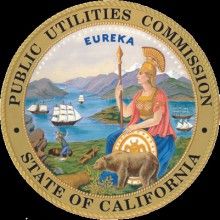Bill increases CPUC transparency, restricts private meetings
by Steve Miller | August 2, 2015 7:00 am
 [1]
[1]CPUC – Agency defends communications
A measure that will be heard this summer in committee at the statehouse aims to tighten the reins on private communications between utilities and the commissioners who regulate them at the California Public Utilities Commission.
But even if SB 660[2] is passed, does it make executives at the commission, which has been pilloried for its tight relationships with select utilities, understand why such legislation is necessary?
At a June meeting at hosted by the Governor’s Office of Planning and Research, branded as the “workshop on government decision-making and open meetings,” CPUC Executive Director Timothy Sullivan said the state’s open meetings law was a deterrent to effective rate making.
“The first major point that I wish to make is that the current form of the discourages the deliberation and involvement of Commissioners in decisions,” he said in prepared remarks. Calling it a “perverse outcome,” Sullivan said the primary reason for “avoiding public deliberation” is a “press of business.”
“If a matter is discussed in a public session during the business meeting and leads to a consensus for change in a proposed decision, then that decision cannot be considered until the next Commission meeting,” Sullivan said.
The review focused on what are called ex parte communications, or contact between the agency and utilities that are held outside of the open meetings act. The contacts are permitted, although several reviews have found that they are exploited in a manner that often gives high dollar utilities an edge in presenting interests to the commission.
An agent from the California Energy Commission noted that the state’s Bagley-Keene Open Meetings Act “constrains candid discussion and collaboration.”
In prepared comments, Kourtney Vaccaro, chief counsel for the CEC, said that 2009 tweaks to Bagley-Keene impaired the ability of commissioners to both license large thermal power plants and compile the required energy policy report, which allows the state to forecast energy demands.
Their cases for keeping things the same regarding the open meetings law were contradicted by a review of the agency’s actions[3] compiled by the Los Angeles law firm of Strumwasser & Woocher.
The review noted secretive communications including judge shopping between the agency and Pacific Gas and Electric Co. that resulted in the ouster[4] of three PGF executives and an aide to former CPUC President Michael Peevey.
Meantime, the legislation from state Sen. Mark Leno, D-San Francisco, seeks to reform CPUC most succinctly by disallowing meetings between commissioners and utility lobbyists concerning ratemaking decisions.
But it would also create standards for when a commissioner should be recused due to undue influence or bias.
“Amazingly, despite substantial evidence of bias and prejudice in the past, CPUC has never once determined that commissioner should be disqualified, based on its current legal standard, that requires a determination that a commissioner has quote, ‘an unalterably closed mind,’ “Leno told the Assembly Committee on Utilities and Commerce earlier this month.
But the ex parte communications are a “safety valve” for parties that cannot be part of utility commission proceedings, said Michael Day, a partner at the law firm Goodin, MacBride, Squeri & Day, which represents energy clients large and small before regulatory agencies.
“Even the parties that we typically represent, cities, counties, environmental groups, consumer groups, developers of renewable resources, these parties have to spend a lot of their own money to participate in PUC proceedings,” Day said. “So for those types of parties, the ability to explain your position to the commission is essential.”
The bill has already gained the support of consumer advocates, some of whom feel that the large utility players have already shown that they have an advantage.
“The PUC is an agency that is unable to figure out whose side it’s on, especially when it comes to the public,” said Richard Holober, executive director of the Consumer Federation of California, which supports reforming the process at the commission. He points to the scandals that have hit the utility in the past several years, with the large utilities skating on both oversight and circumstance.
“It seems pretty clear that the wealthy utilities have unlimited access to as least certain commissioners,” Holober said. “And they have used that access to negotiate deals in private.”
The measure in June moved through the state Senate with a 29-7 vote.
See and read the transcript for the committee hearing here[5].
- [Image]: http://calwatchdog.com/wp-content/uploads/2015/07/2-CPUG-Logo.jpg
- SB 660: http://www.leginfo.ca.gov/pub/15-16/bill/sen/sb_0651-0700/sb_660_cfa_20150710_101358_asm_comm.html
- review of the agency’s actions: http://www.cpuc.ca.gov/NR/rdonlyres/1EE7A892-D7C3-43C7-9163-E60AD859463E/0/StrumwasserReport.PDF
- resulted in the ouster: http://www.sfgate.com/news/article/Shakeup-at-PG-amp-E-state-agency-over-5757375.php
- here: http://digitaldemocracy.org/hearing/409?startTime=1723&vid=mzRsScITOGM
Source URL: https://calwatchdog.com/2015/08/02/agency-chiefs-skeptical-transparency-adjustment-proposed-cpuc/